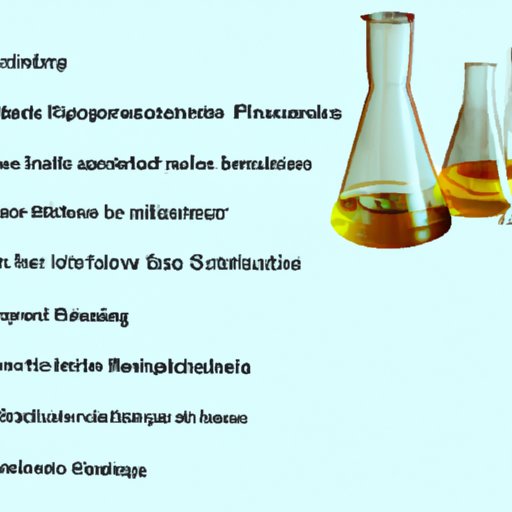Introduction
Trials in science are a form of research method used to study cause and effect relationships between two or more variables. They are used to assess the effectiveness of treatments, interventions, or other methods and are one of the most reliable ways of determining if a particular approach is successful. The purpose of trials in science is to provide evidence that can be used to make informed decisions about how best to proceed with a particular problem or issue.

A Comprehensive Guide to Understanding Trials in Science
In order to better understand trials in science, it is important to first consider what they are and the different types of trials used in scientific research.
What are trials?
Trials in science involve the systematic testing of hypotheses to determine whether or not a certain phenomenon is true. They involve collecting data in a controlled environment, such as a laboratory, and then systematically analyzing the results to draw conclusions. The data collected during a trial is then used to support or refute a hypothesis, which is a statement that expresses a potential relationship between two variables. For example, a hypothesis might state that “exposure to sunlight increases the risk of skin cancer.”
Different types of trials used in scientific research
There are several different types of trials used in scientific research, each of which has its own advantages and disadvantages. These include randomized controlled trials, observational studies, case-control studies, cohort studies, and clinical trials. Randomized controlled trials involve randomly assigning participants to receive either a treatment or a placebo, while observational studies involve observing the behavior of people without manipulating any factors. Case-control studies compare the characteristics of individuals who have a certain condition with those who do not, while cohort studies follow groups of people over time to measure changes in health. Finally, clinical trials involve testing a new drug or treatment on humans to assess its safety and efficacy.
How trials help advance our knowledge of the world
Trials in science are essential for advancing our knowledge of the world and developing new treatments and interventions. By conducting trials, researchers can gain insights into the causes of diseases, develop more effective treatments, and assess the safety and efficacy of new drugs and therapies. Additionally, trials are also used to evaluate the effectiveness of public health interventions and policies, such as vaccination programs and environmental regulations.

Benefits and Challenges of Conducting Trials in Science
As with any type of research, there are both benefits and challenges associated with conducting trials in science. It is important to consider both when deciding whether a trial is the right approach for a particular project.
Advantages of conducting trials in science
The primary benefit of conducting trials in science is the ability to draw objective conclusions from the data collected. By using a randomized controlled design, researchers can eliminate bias and ensure that their results are valid and reliable. Additionally, trials can provide insight into causal relationships between variables, allowing researchers to identify potential causes of diseases and develop effective treatments. Finally, trials are also beneficial in that they can provide evidence to inform public policy decisions.
Disadvantages of conducting trials in science
There are also some potential drawbacks associated with conducting trials in science. One major challenge is the cost of conducting a trial, which can be prohibitively expensive depending on the type of research being conducted. Additionally, trials can take a long time to complete, meaning that results may not be available for many years. Finally, trials also present ethical dilemmas, as they often involve exposing people to potentially harmful substances or treatments.
Ethical Implications of Trials in Science
Due to the potential risks associated with trials in science, it is important to consider the ethical implications of conducting such research. There are several potential ethical issues to consider, such as the use of human subjects, the risks posed by experimental treatments, and the potential for exploitation of vulnerable populations.
Potential ethical issues regarding trials in science
One of the major ethical concerns related to trials in science is the use of human subjects. In order to conduct a trial, researchers must recruit volunteers who are willing to participate in the experiment and potentially expose themselves to harm. Additionally, trials often involve the use of experimental treatments that could have unknown risks, so it is important to ensure that all participants are fully informed of the potential risks and benefits before agreeing to participate.
Possible solutions to ethical dilemmas
To address potential ethical issues, researchers should always obtain informed consent from participants prior to conducting a trial and ensure that all participants are aware of the potential risks and benefits. Additionally, researchers should strive to protect the rights and dignity of participants throughout the duration of the trial. Finally, researchers should also adhere to strict protocols and guidelines set out by governing bodies to ensure that all trials are conducted ethically.
Conclusion
In conclusion, trials in science are a valuable tool for advancing our understanding of the world and developing new treatments and interventions. While there are various benefits associated with conducting trials, there are also potential ethical issues that must be taken into consideration. By following ethical guidelines and obtaining informed consent from all participants, researchers can ensure that trials are conducted responsibly and that the rights and dignity of all participants are respected.
(Note: Is this article not meeting your expectations? Do you have knowledge or insights to share? Unlock new opportunities and expand your reach by joining our authors team. Click Registration to join us and share your expertise with our readers.)
